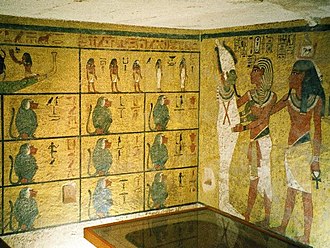It happened today - November 26, 2015
 On November 26, more than 3,000 years later, someone finally knocked. I refer of course to November 26 1922 and the door of King Tut’s tomb. The boy pharaoh achieved lasting fame and glory of a sort that largely eluded him during his brief life. And Hollywood went nuts with mummies.
On November 26, more than 3,000 years later, someone finally knocked. I refer of course to November 26 1922 and the door of King Tut’s tomb. The boy pharaoh achieved lasting fame and glory of a sort that largely eluded him during his brief life. And Hollywood went nuts with mummies.
Much of the credit goes, or should go, to Howard Carter, one of those larger-than-life British explorers who had already located two significant tombs in the thoroughly plundered Valley of the Kings, thought to be bereft of remaining treasures. (One was that of Queen Hatshepsut, whose funerary temple is one of the greatest buildings in the world, by the way). And then in 1922 he made his biggest find, Tut’s magnificent, untouched tomb.
Much had happened since Tut died, after an undistinguished decade in which he mostly undid the radical religious innovations of his father Akhenaten. Tut was originally Tutankaten after Aten, the monotheistic sun god Akhenaten more or less invented but changed his name and… am I boring you?
If so I apologize. Egypt is weirdly fascinating and yet truly obscure and distant; the gods and goddesses of ancient Greece remain familiar in their broad outlines to any educated person whereas Osiris and Horus and that crowd could be jackals in the desert for all we know (and at least one of them looked like one but I don’t know who either). And its religious quarrels and controversies didn’t really lead anywhere; the Greek gods yielded to Christianity whereas the Egyptians just sit there like a Sphinx, mute and puzzling.
There, I think, lies paradoxically the enduring fascination of Egypt. When Tut’s tomb was sealed, and then he and his father were officially disgraced, their records including the location of their tombs destroyed, and then excavations for the tomb of Rameses VI two centuries later buried it in rock chips, it closed the door definitively on whatever his hopes were and threw away the key. They could not be more vanished if they were on Jupiter. And yet everything looked exactly the way it did the day they closed the door amid lamentation, aspiration and controversy.
Tut’s curse also got him plenty of good press despite not existing. But the main thing is the haunting way the lifelike nature of the artefacts seemed to preserve, in eerily fragile beauty, the hopes we all have that our life might somehow mean something permanent.
In life he was just annoying. In death, frozen in time, rescued from obscurity, he became weirdly magnificent.